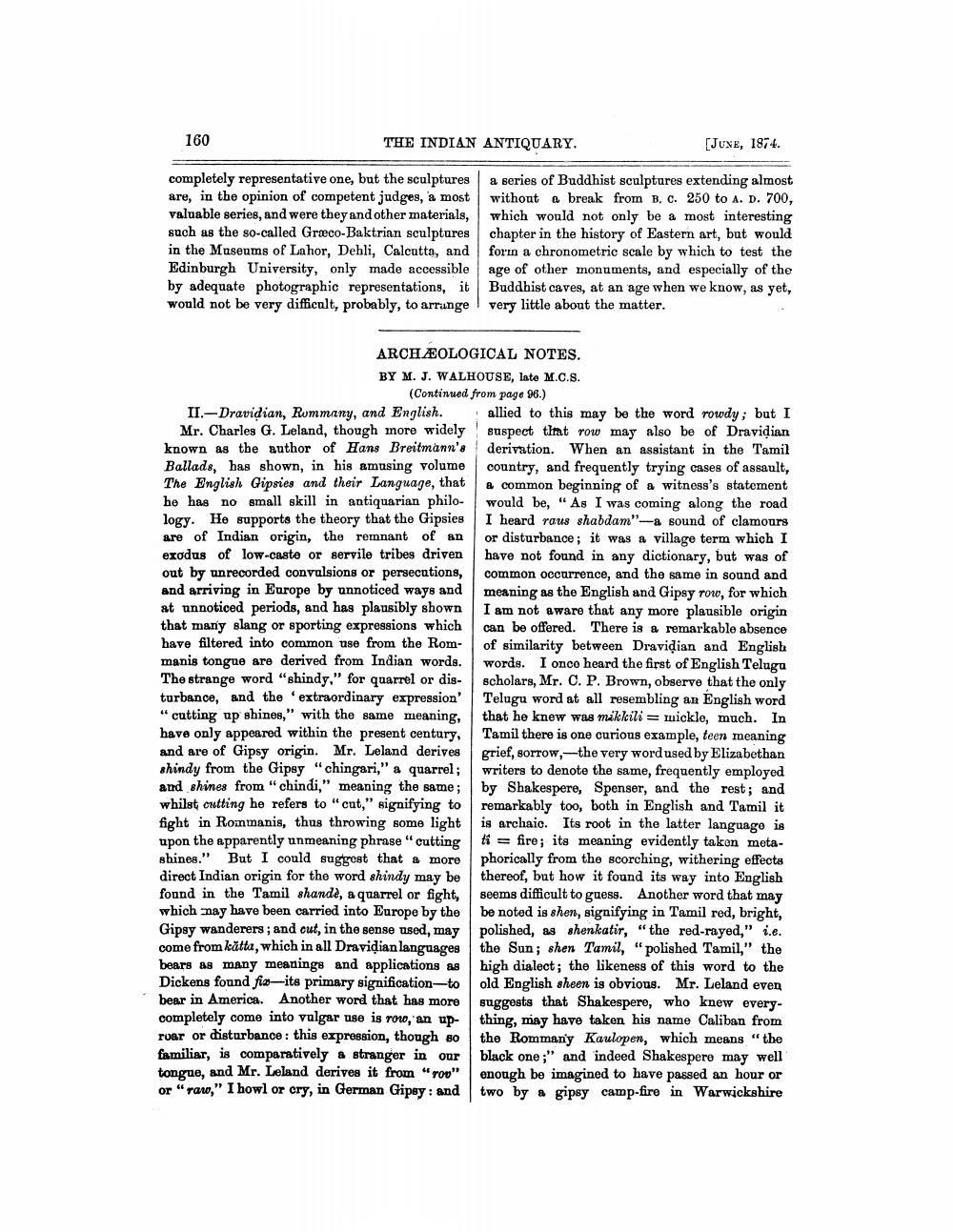________________
160
THE INDIAN ANTIQUARY.
[JUNE, 1874.
completely representative one, but the sculptures are, in the opinion of competent judges, a most valuable series, and were they and other materials, such as the so-called Graeco-Baktrian sculptures in the Museums of Lahor, Dehli, Calcutta, and Edinburgh University, only made accessible by adequate photographic representations, it would not be very difficult, probably, to arrange
a series of Buddhist sculptures extending almost without a break from B. C. 250 to A. D. 700, which would not only be a most interesting chapter in the history of Eastern art, but would form a chronometric scale by which to test the age of other monuments, and especially of the Buddhist caves, at an age when we know, as yet, very little about the matter.
ARCHÆOLOGICAL NOTES. BY M. J. WALHOUSE, late M.C.S.
(Continued from page 96.) II.-Dravidian, Rummany, and English. allied to this may be the word rowdy; but I Mr. Charles G. Leland, though more widely suspect that row may also be of Dravidian known as the author of Hans Breitmann's derivation. When an assistant in the Tamil Ballads, has shown, in his amusing volume country, and frequently trying cases of assault, The English Gripsies and their Language, that a common beginning of a witness's statement ho has no small skill in antiquarian philo- would be, "As I was coming along the road logy. Ho supports the theory that the Gipsies I heard raus shabdam"-a sound of clamours are of Indian origin, the remnant of an or disturbance; it was a village term which I exodus of low-caste or servile tribes driven have not found in any dictionary, but was of out by unrecorded convulsions or persecutions, common occurrence, and the same in sound and and arriving in Europe by unnoticed ways and meaning as the English and Gipsy row, for which at unnoticed periods, and has plausibly shown I am not aware that any more plausible origin that many slang or sporting expressions which can be offered. There is a remarkable absence have filtered into common use from the Rom- of similarity between Dravidian and English manis tongue are derived from Indian words. words. I onco heard the first of English Telugu The strange word "shindy," for quarrel or dis- scholars, Mr. C. P. Brown, observe that the only turbance, and the 'extraordinary expression' Telugu word at all resembling an English word "cutting up shines," with the same meaning, that he knew was makkili = mieklo, much. In have only appeared within the present century, Tamil there is one curious example, teen meaning and are of Gipsy origin. Mr. Leland derives grief, sorrow,--the very word used by Elizabethan shindy from the Gipsy "chingari," a quarrel; writers to denote the same, frequently employed and shines from chindi," meaning the same; by Shakespere, Spenser, and the rest; and whilst ontting he refers to "cut," signifying to remarkably too, both in English and Tamil it fight in Romanis, thus throwing some light is archaic. Its root in the latter language is upon the apparently unmeaning phrase "cutting ti = fire; its meaning evidently takon metashines." But I could suggest that a more phorically from the scorching, withering effects direct Indian origin for the word shindy may be thereof, but how it found its way into English found in the Tamil shande, a quarrel or fight, seems difficult to guess. Another word that may which may have been carried into Europe by the be noted is shen, signifying in Tamil red, bright, Gipsy wanderers; and cut, in the sense used, may polished, as shenkatir, “the red-rayed," i.e. come from kätta, which in all Dravidian languages the Sun; shen Tamil, "polished Tamil," the bears as many meanings and applications as high dialect; the likeness of this word to the Dickens found fix-its primary signification-to old English sheen is obvious. Mr. Leland even bear in America. Another word that has more suggests that Shakespere, who knew everycompletely come into vulgar use is row, an up- thing, may have taken his name Caliban from ruar or disturbance: this expression, though so the Rommany Kaulopen, which means "the familiar, is comparatively a stranger in our black one;" and indeed Shakespero may well tongue, and Mr. Leland derives it from "roo" enough be imagined to have passed an hour or or "raw," I howl or cry, in German Gipsy: and two by a gipsy camp-fire in Warwickshire




